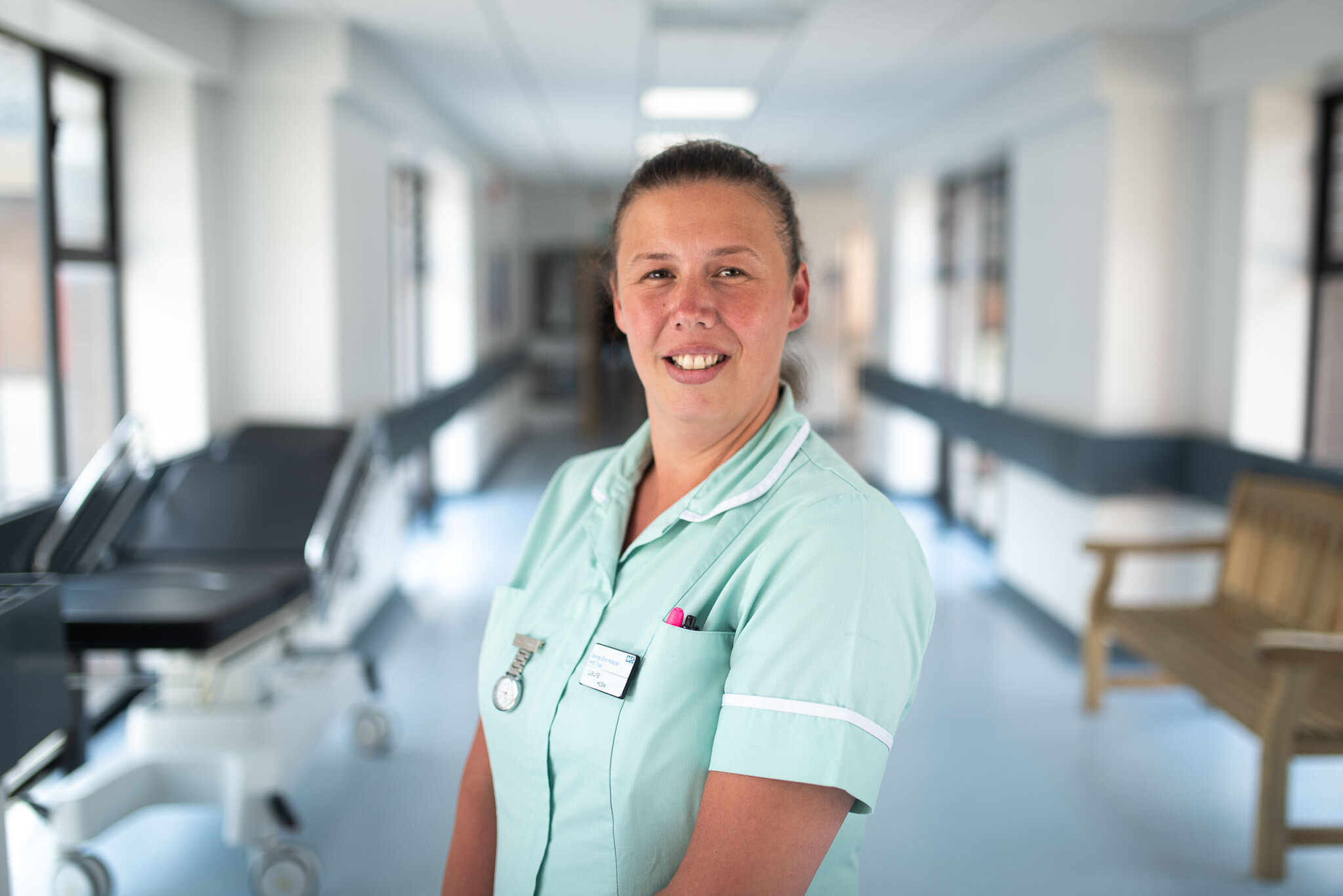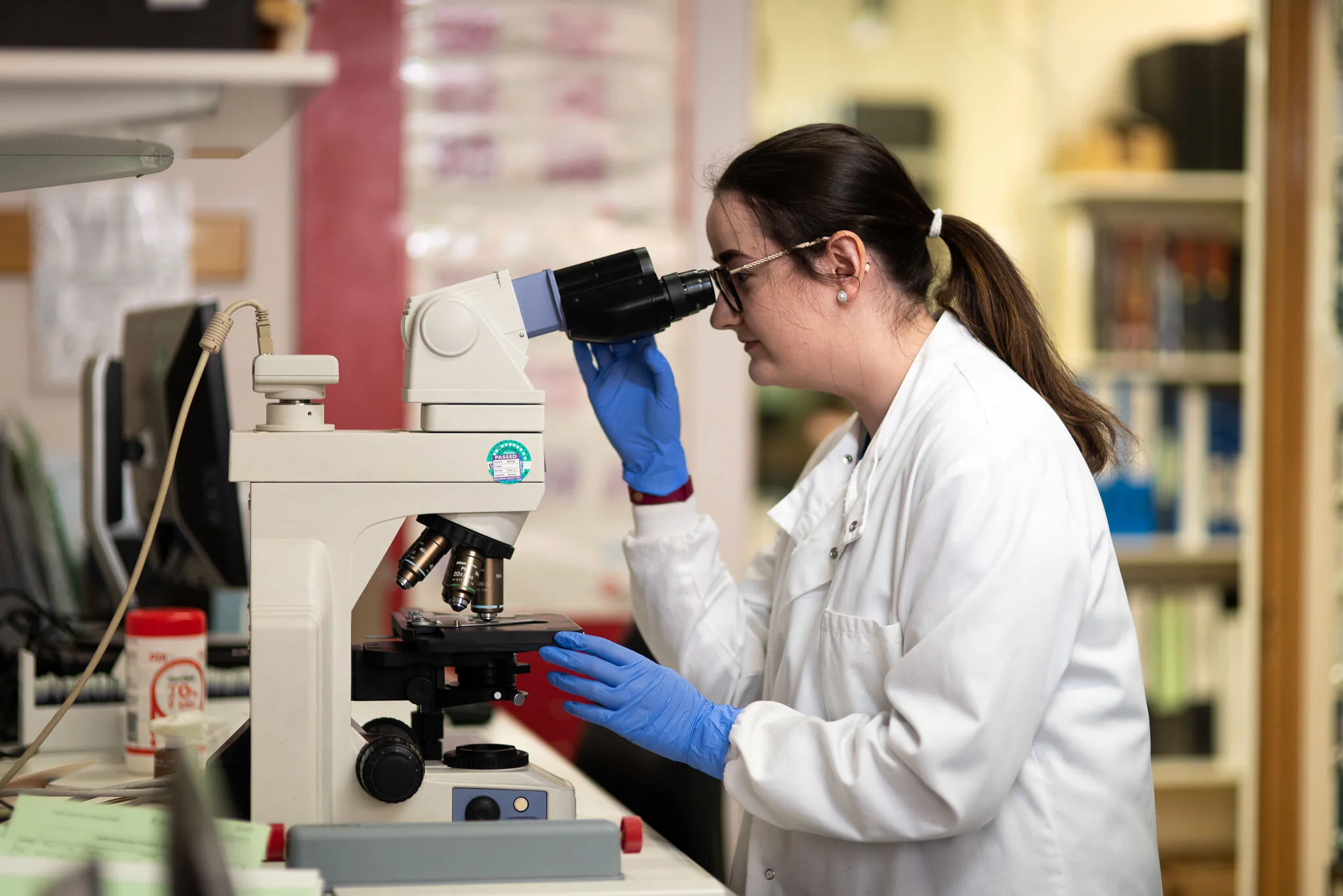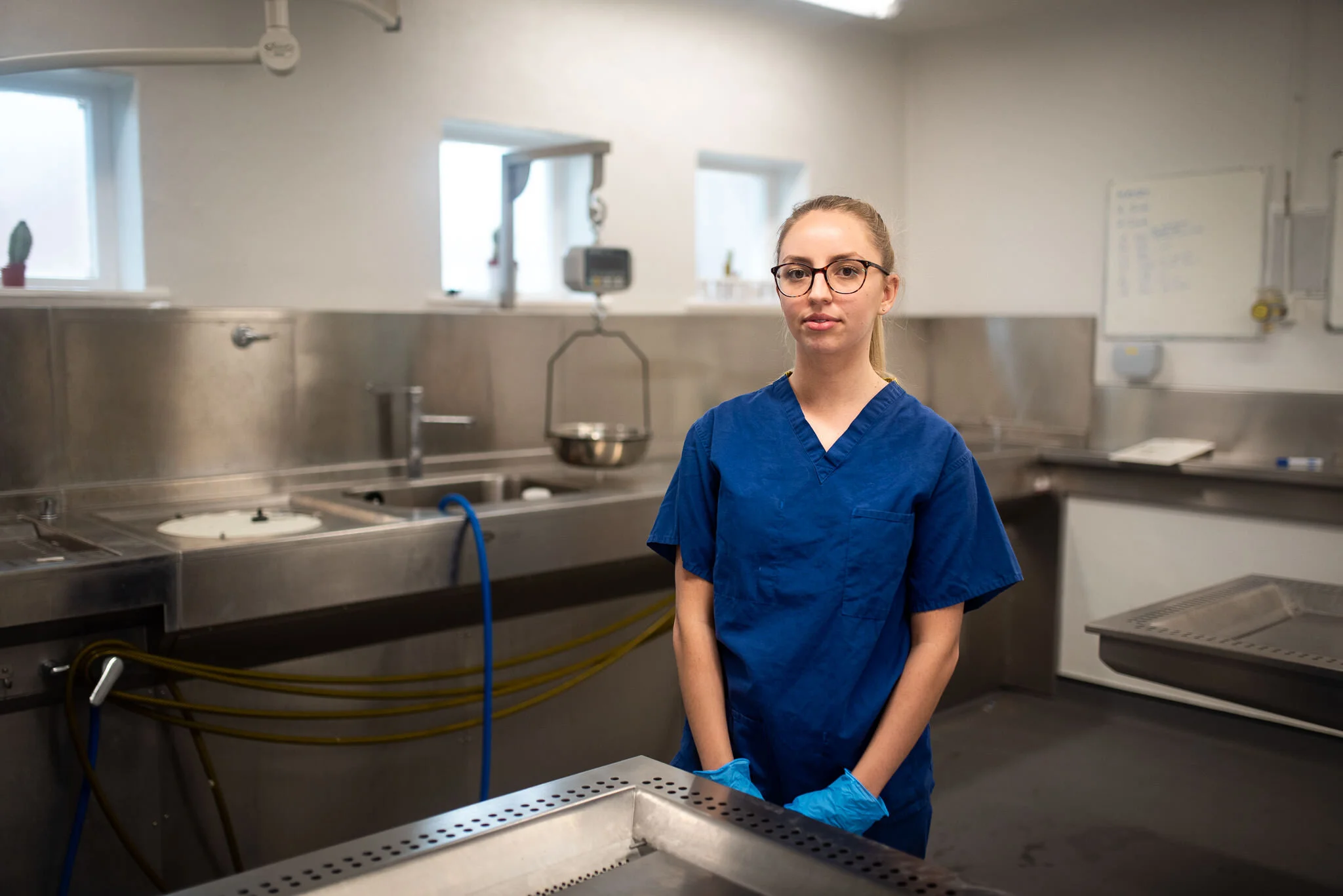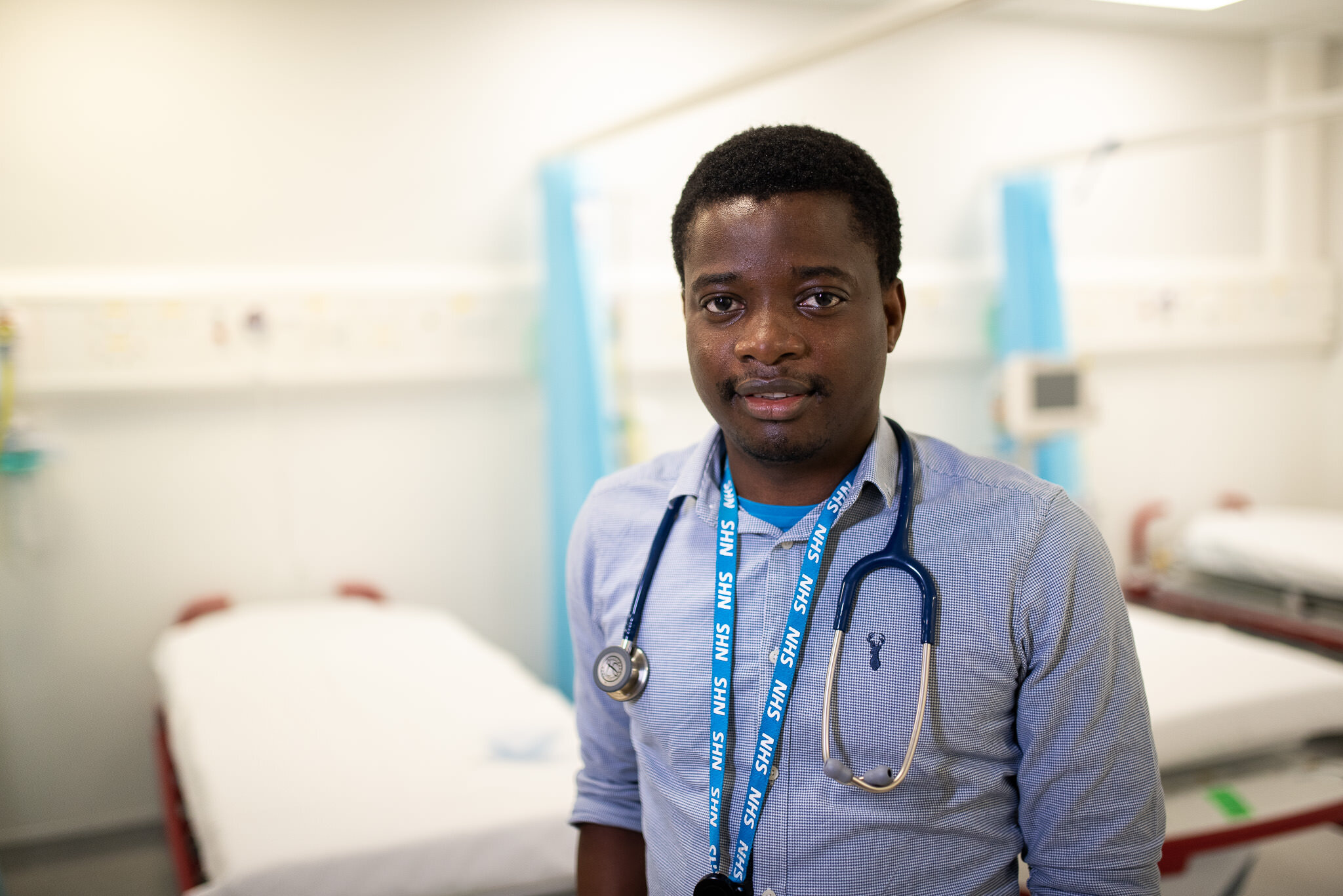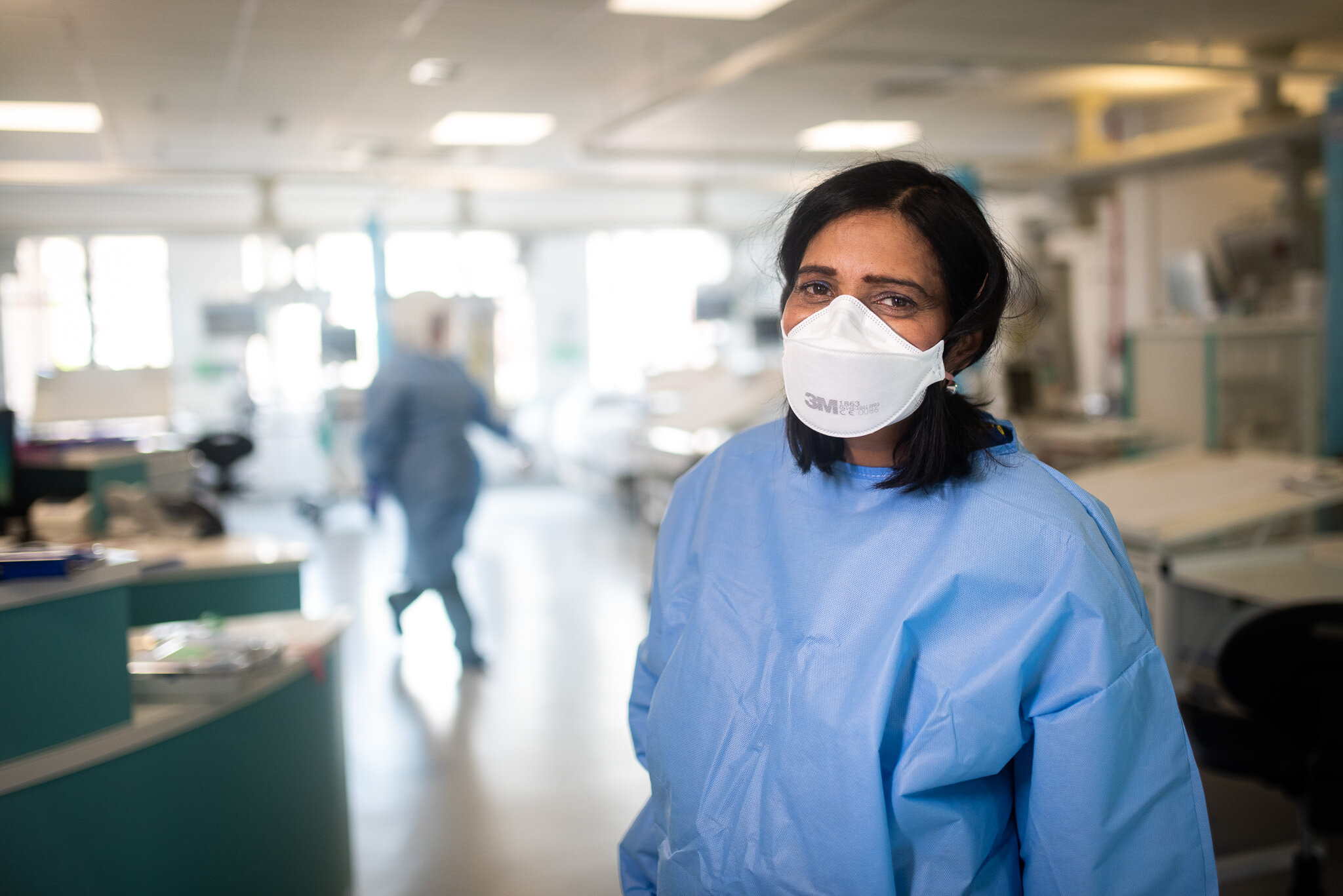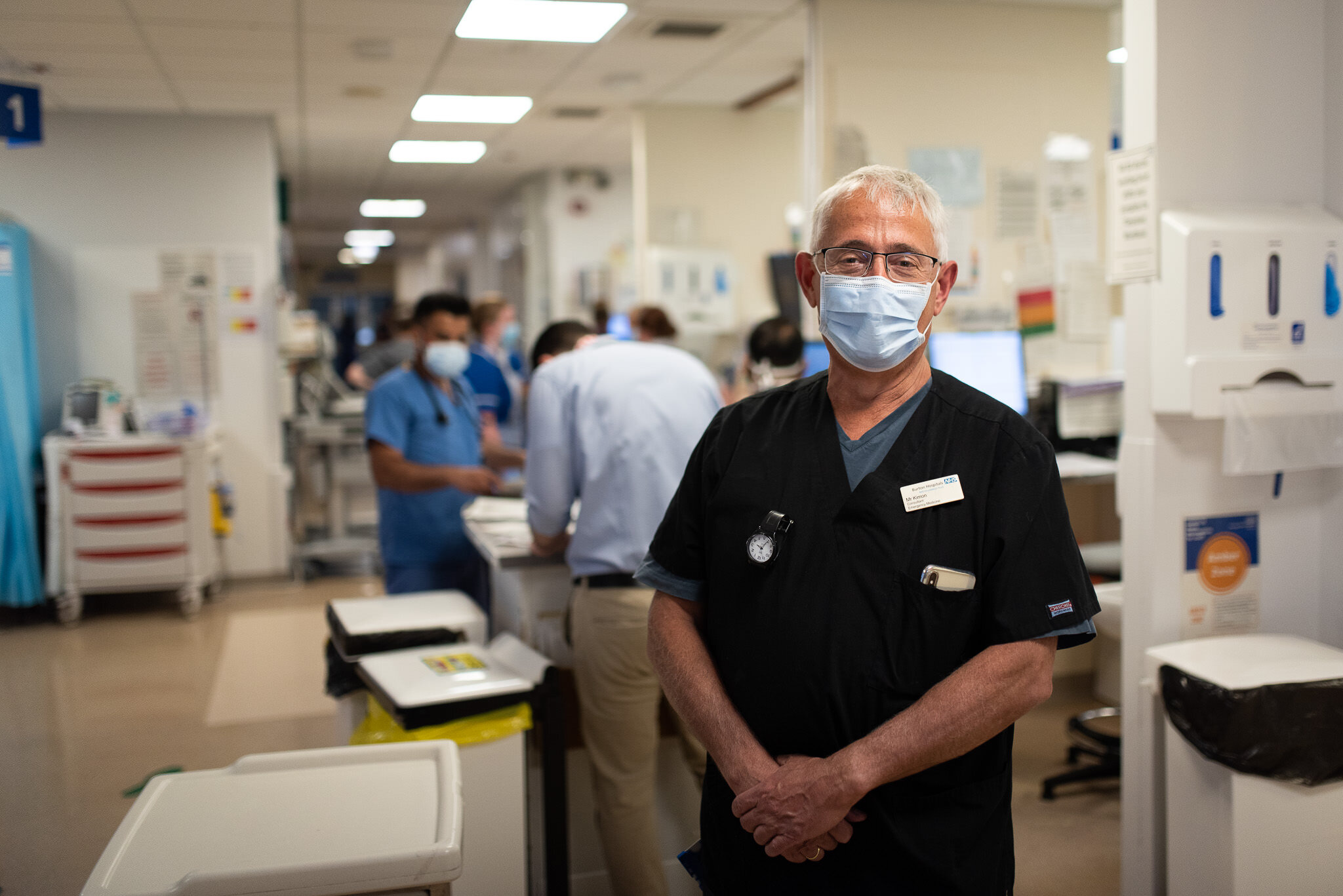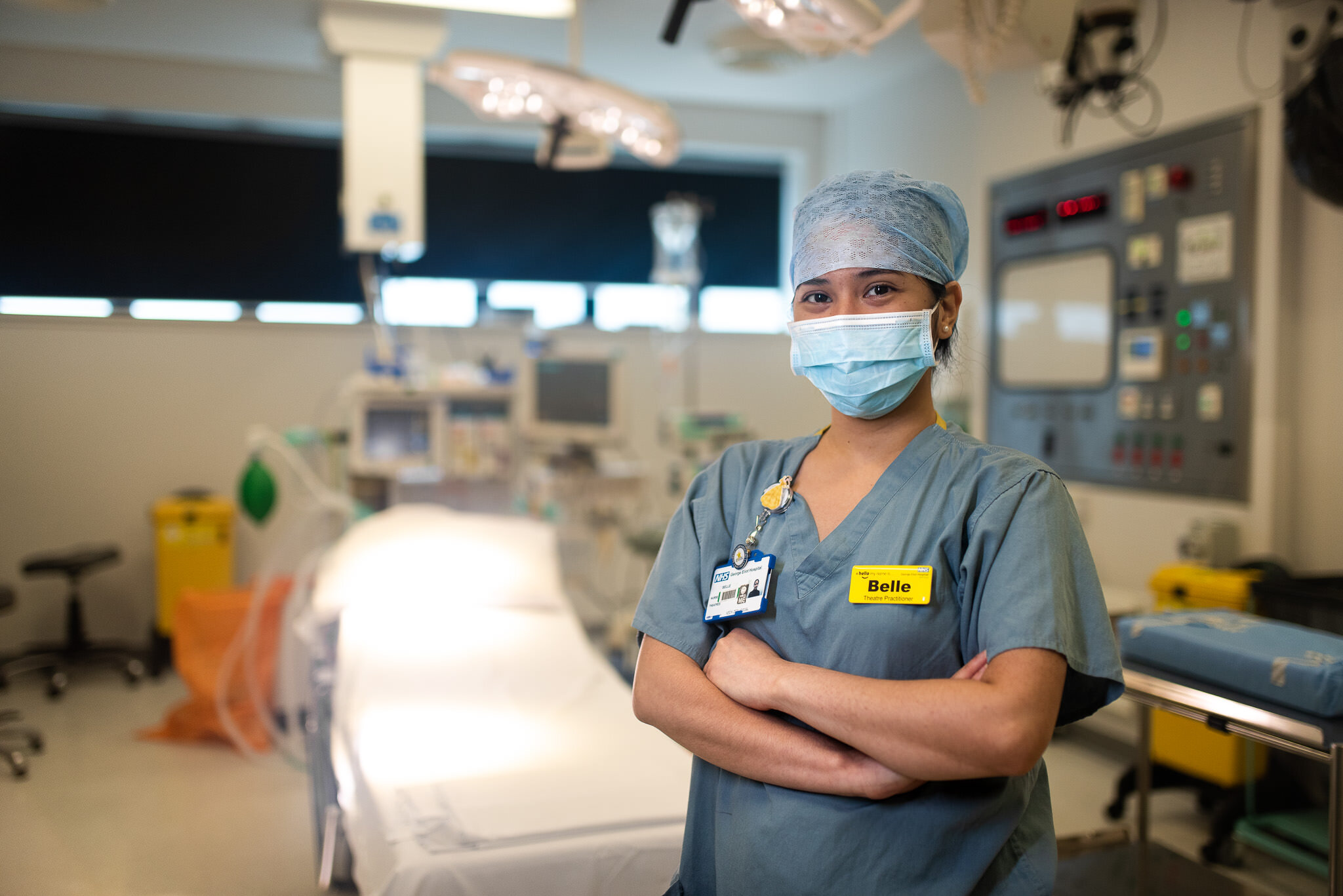
Humans of the Pandemic
Part B
Welcome to the second selection in Humans of the Pandemic.
During the first COVID-19 pandemic lockdown, medical student Matthew Thompson photographed portraits of 67 staff across NHS George Eliot Hospital. Inspired by what he saw while working on the respiratory ward, Matthew tried to meet and feature someone in every role that had changed, adapted or run at capacity to play an often hidden part in patient care. He soon discovered there were far more than he expected.
This is the second of three parts in this series, featuring 23 staff. Photographed between April and August 2020, each participant features two photos where possible and appropriate, according to their location and guidelines at the time the photo was taken: one with their PPE donned and one with their face revealed briefly. Some participants have been kind enough to share their thoughts and feelings about working during the “first wave” of the pandemic.
Adam
Funeral Operative & Embalmer
Adam felt cautious during the pandemic, and believes uncertainty about COVID's part in some patients' lives has impacted families' chances for a "proper goodbye".
Belle
Theatre Nurse
Cristy Belle "tried [her] best to help as much as [she] can" while feeling "anxious as a lot changed in [her] department to cope with the worsening situation." As a theatre nurse, she felt "out of [her] comfort zone" helping patients in ITU, but her colleagues "helped her through [this] learning experience." She believes "it has been a challenge for the NHS to manage and treat patients while keeping the public safe at the same time". "Especially vulnerable" patients with chronic conditions have faced a "significant impact [as] most elective surgery and treatments were delayed/cancelled to protect [them] from acquiring the virus in hospital." Despite the pandemic being "one of the most challenging times in [her] nursing career", she hopes this "made people realise how strong the NHS is, and that it will always rise to the occasion, not matter what happens."
Cara
Speech and Language Therapist (SALT)
Cara felt apprehensive and anxious, followed by "camaraderie and solidarity with an almost energetic excitement". She had to adapt to the challenge of communicating while wearing PPE "when many of our communication-impaired patients had previously relied on seeing our mouths and lips".
Daljit
Director of Nursing and Infection Prevention
Daljit has drawn on her years of experience to help her "make decisions in the context of great uncertainty" as the Director of Infection Prevention & Control. She believes "the pandemic has really tested the resilience of the capacity of the NHS. We have needed to think out of the box about how we use our resources and utilise our workforce. There have been some positive developments too which will change the way care is delivered. The use and impact of information technology is incredible."
Gretta
COVID Emergency Dept. Healthcare Support Worker
Gretta had to adapt and learn new clinical skills as her healthcare support role switched from Ambulatory Care to the COVID Emergency Department. She feels the "great team of nurses has eased the transition", but extra shifts were needed to ease the impact on the NHS.
Haleem
Lead Radiographer - Interventional Radiology
Lead radiographer Haleem felt tired from "adapting everything in the way we work, with a massive backlog of patients". He believes "the NHS was already under an incredible amount of stress mainly due to staffing, [and] was made worse by the pandemic. [However] we have all stuck together and got through the worst of it." He hopes "the general public and politicians don't forget us after 6 months."
Jessica
FY1 Doctor - General Surgery
First-year doctor Jessica felt "apprehensive and nervous" about going to work and PPE. She was moved from her surgery role to an "incredibly tiring antisocial [emergency COVID] rota to provide adequate staffing should there be a peak. However once it came, we were well staffed, supported and [she] felt proud how felixibly everybody worked." Since then, she is concerned that the staff feel tired and "are going to be forgotten about after this". She thought "it was nice to have A&E only filled with patients who needed to be there", and hopes salaries will be raised in recognition "for the hours we do."
Karen
Midwife
Kate
Medical Student - Third Year
Keen to help out when she was sent home from medical school placement, Kate describes working alongside the hard-working nursing staff as a "privilege" and "amazing experience." She says it's "been hard on the staff. Everyone seemed to be doing well, but I think there have been effects of seeing so many people ill and dying. It was tough to see patients having such a difficult time, especially without being able to see their families. But there were a few beautiful moments, like facetiming someone's grandchildren and seeing them smile."
Keith
Security
Laura
Respiratory Ward Healthcare Support Worker
Working on the respiratory ward, Laura felt "scared for myself and my children" during the pandemic. She feels the NHS has been affected "tremendously, [with] new ways of working, procedures cancelled, wards changed around, staff sickness/isolation/shielding etc.," but hopes the reduced time to discharge patients back home and arranging care packages will continue.
Lavinia
Biomedical Assistant
Lavinia felt a little lost as she "found myself worrying for those I care about" but "optimistic that no matter the difficulty of the situation, we have come together and worked hard to help others during the crisis." As a biomedical scientist new to the hospital, she "had to adapt very quickly the processes in place while learning the new regulations. It was exciting to learn so much, but also difficult as things were constantly changing because we didn't know much about the virus." She feels "the NHS was hit hard with the crisis" but the "response has been incredible."
Lucy
Physiotherapist Team Leader - Respiratory Medicine
Lucy "felt scared of the invisible enemy that we're all fighting and its effect upon our friends and family. [She] felt isolated in part as many people were apprehensive about seeing me when restrictions were relaxed due to where [she] works. It's been a hard few months both physically and mentally." As a respiratory physiotherapist, her classes were cancelled so she could focus on ward patients. She and her ward colleagues had to upskill quickly to deliver CPAP [ventilation] as it became a High Dependency Unit. Lucy found she "would sit with patients offering support as many were extremely unwell, scared and alone in hospital." She believes "the NHS has been amazing in the way it has pulled together and learned so much about a virus that we knew nothing about." As a way to reduce waiting times that increased, she has embraced "inventive" methods such as virtual exercise classes for breathless patients. "The patients seem to have enjoyed them and we have had some laughs doing them." She hopes the bonds created between hardworking staff to support each other "continue to develop."
Lucy
SHO Doctor - Surgery
Martin
Chaplain
As a hospital chaplain, Reverand Martin has spent more time with patients where families normally would. With patients unable to have visitors, sometimes in their final days, Martin has increasingly become a reassuring, non-clinical friend to patients on the wards.
Megan
Mortuary Assistant
Megan's job changed dramatically as she was redeployed to the Mortuary from the Hospital Sterilisation & Disinfection Unit. “It was difficult at first as there were no policies or procedures for dealing with the deceased infected with the virus, however once policies were put into place it became much easier to protect ourselves and other staff against infection.”
Michelle
Bereavement Administrator
Olaoluwa
GP Training Doctor in A&E
Philippa
Medical Student - Third Year
Rehana
Outpatients Dept. Receptionist
Rehana "felt very nervous and scared to come in" as a receptionist in the outpatient department because "we are unsure who is carrying what." She believes "a lot of visitors and patients are afraid to come in as they feel intimidated by the situation." She feels "NHS staff have done a fantastic job [and is] proud to be part of this."
Richard
Radiology Operating Department Practitioner
Richard alleviated his anxieties by "focusing on adhering to policies, guidelines and protocols." As an Operating Department Practitioner, he "treated it with the same amount of respect as you would for any other potentially dangerous pathogen." His role "shifted its primary focus to treating palliative and cancer-care-pathway patients," with immunocompromised surgical patients becoming an "increasingly challenging aspect." He hopes the renewed "reverance [of the NHS] will continue to exist as a component of our national identity."
Robert
ICU Charge Nurse
Robert felt "a mixture of overwhelming gratitude from the support and gratitude displayed [but] disbelief at the ignorance and hysteria displayed by some people." He found himself "having to make decisions that I feel were beyond my role." He hopes the newly "reinforced importance" of the NHS will be remembered.
Tina
Respiratory Ward Nurse
Tina found caring for COVID patients scary and heartbreaking. She has appreciated the "importance of family during these difficult times", particularly from seeing the "impact it has had on patients not having them visit." She feels a lot of NHS staff have been affected from seeing the "devastaton this virus has caused", herself included. She believes the pressures have proved the "value and strength of the NHS", and hopes the public continue to support and understand the value of it.



















